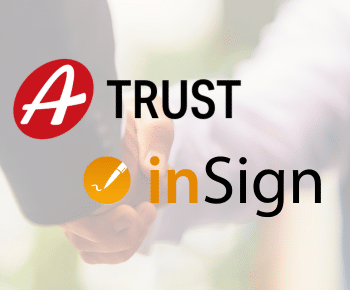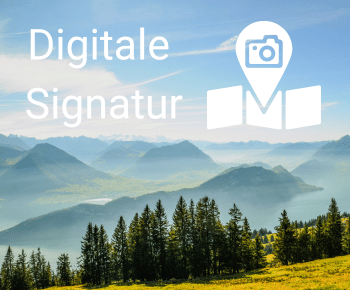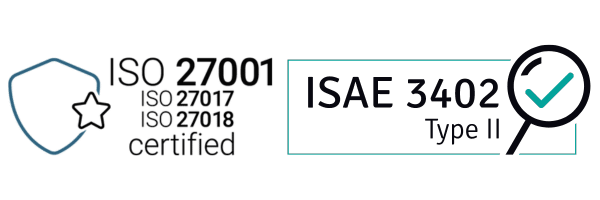
Cooperation with leading qualified trust service provider in Austria
As of now, inSign customers have the advantage of receiving everything from a single source and do not have to conclude an additional contract with a third-party provider. In the following interview with Sven Glöckner, Co-Managing Director & CFO you can find out more about the collaboration.
When did the talks about a possible cooperation with inSign begin?
“The beginnings of the collaboration between the two companies date back to the phase when inSign was still part of iS2. Specifically, a well-known customer from the insurance sector was enabled to use qualified electronic signatures from A-Trust with the A-Trust product “Signature Box”, whereby inSign took over the integration of the A-Trust signature solution due to its technical expertise and broad experience with insurance customers. An expansion of the partnership then led to a sales cooperation, which was agreed shortly after the transition from inSign to the BSI Group in 2023.”
How do both A-Trust and inSign benefit from the collaboration?
“inSign benefits in particular from the easy access to the Austrian market due to the more than four million active QES certificates from A-Trust in the country. A-Trust, in turn, benefits from the fact that the integration into inSign expands the scope of its certificates, making them increasingly popular on the German market.”
What added value do customers have?
“In Austria in particular, customers have the advantage of being able to use their existing “mobile phone signature” or “ID Austria” in conjunction with inSign. This makes implementation particularly easy for the customer. The benefits of A-Trust certificates can also be utilised outside Austria, as they are valid for a full five years throughout the European Economic Area. In order to obtain a personal certificate outside of Austria, A-Trust offers various identification procedures which can easily be carried out online.”
What is different in Germany than in Austria? What is distinctive?
“The biggest difference is probably the number of active, qualified personal certificates in the population of the two countries. Thanks to the state “mobile phone signature” or “ID Austria”, the QES has long been established in Austria whereby almost all E-government and QES transactions are based on certificates from A-Trust. In Germany QES is currently only available from private providers which means that the German population is not yet fully aware of it. The German A-Trust subsidiary, A-Trust Vertrauensdienste GmbH, utilises the qualified certificates and the wealth of experience of its parent company in Vienna to enter into international sales and technological partnerships and thus also promote QES in Germany.”
How do you assess the current acceptance of the QES and its development and acceptance in the coming years?

About A-Trust
A-Trust is Austria’s leading qualified trust service provider and has been a reliable provider of certificate and signature solutions for compliance, integrity and convenience for over 20 years. Through the development of the so-called “mobile phone signature”, A-Trust has been significantly involved in the digitalisation of the country and continues to work closely with Austrian federal ministries for the planned changeover to “ID Austria”. In 2019, A-Trust also entered the German market with a wholly-owned subsidiary in Germany.
About inSign
The electronic signature solution inSign has been established on the market for over 10 years, initially as a market leader in the insurance industry and today as a market leader in various industries in Germany. True to the motto Made & Hosted in Germany – data protection first and foremost – inSign has won many well-known customers. inSign supports advanced and qualified electronic signatures in accordance with eIDAS and ZertES. For the qualified electronic signature, inSign works together with various qualified trust service providers.
- Further articles
More on the topic of digital signatures


